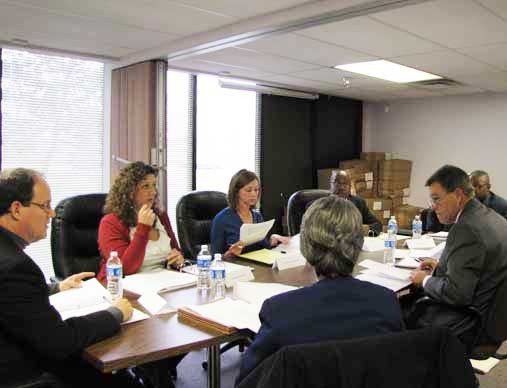
Kansas City’s new land bank board held its first meeting yesterday. The group elected officers, adopted bylaws, and handled other details around getting the new Land Bank started. Members from left to right include: Vince Gauthier, Diane Burnette, Jennifer Dameron, Myron Moore, Kevin Masters, Deputy Director of Neighborhood and Community Services David Park and Assistant city attorney Amelia McIntyre.
Kansas City’s new land bank – with its promise of returning abandoned properties to productive use – is finally in business. The land bank, made up of five commissioners, held its first meeting on Thursday.
Several dozen neighborhood, community and business representatives attended the first meeting, even though the agenda included only electing officers and reading the proposed by-laws.
The land bank will be run by five commissioners. Members include:
- Diane Burnette, Director of MainCor and currently the chair of the Land Trust of Jackson County, representing Jackson County;
- Kevin Masters, Director of Government Relations at the Kansas City Public Schools representing the district;
- Vincent Gauthier, a public and private developer;
- Jennifer Dameron, an attorney who is currently staying home with her children;
- Myron Moore, who describes himself as a visionary and organizer in Kansas City.
Moore, Gauthier and Dameron are appointed by the mayor. The group choose Dameron, an attorney, as the chair and Masters as co-chair. Gauthier will be the treasurer.
According the David Park, deputy director of Neighborhood and Housing services, other cities have found land banks to be useful in dealing with the growing inventory of abandoned properties.
All of the 3000 properties currently held by the Land Trust of Jackson County will be transferred to the land bank. He anticipates donations of other properties as the land bank begins operation.
The city has been mowing, cleaning, boarding up and demolishing abandoned properties, and much of this activity will be transferred to the land bank. The land bank will obtain revenue from sale of properties, cash donations from potential lenders, and real estate taxes for three years after the sale of properties.
The land bank has more flexibility in handling vacant properties than the land trust. It can bid on properties in targeted areas that are sold at tax foreclosure auctions. It can also accept donated property from banks and other entities. With the approval of a majority of its commissioners, it can sell vacant lots at a discounted rate to adjacent owners. It can also negotiate to purchase properties.
“The city was looking for ways to deal with abandoned properties more effectively, and also to deal with properties that are not yet in foreclosure,” Park said.
At its first meeting, the land bank board adopted a budget for the rest of this fiscal year and the next one. They agreed to ask the city for a budget of $1.15 million for demolition and $350,000 for boarding up buildings. That’s more than the $1 million demolition budget recommendation the city had suggested, but commissioners said they need to have the funds to do the necessary demolition.
“Dangerous buildings have been a priority for years,” Commissioner Kevin Masters said. “If we’re going to be responsible for demolitions, we need to make sure we have the money to do them.”
As the commissioners mapped out their plans for the next few months, they were peppered with questions from the audience. How long will property remain boarded up in the neighborhoods? Will historic properties be demolished? How will the land bank decide which buildings to board up and which to tear down?
The commissioners responded that they don’t have a solid plan yet, and said they are looking for input. They have already asked for community feedback on their bylaws, and they plan to establish an advisory committee to help them make decisions as they get the land bank up and running.



Who’s talking